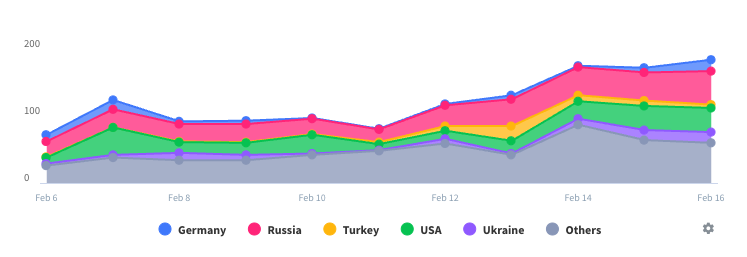
VanderbiltDDx - Case Simulator
Veröffentlicht von:
Vanderbilt University Medical Center
Beschreibung
The VanderbiltDDx Case Simulator (“App”) helps users to practice and refine their diagnostic skills. It creates realistic, fun, easy-to-evaluate adult (age 16-75+) patient cases. The intended audience includes medical, nursing, physician assistant, and other health professional students; physicians undergoing residency and fellowship training; nurses in advanced practice training; and practicing health professionals. The App generates cases using a large, evidence-based, literature- derived knowledge base (630+ disorders seen by internists, 4500+ findings). To construct each simulated case, the App randomly selects logically consistent findings based on how often the literature indicates the findings occur in patients with the targeted disorder.
Vanderbilt is distributing the App free-of-charge via its Portal on the App Store for use in clinical education. The App, once installed, is self-contained on users’ iOS devices. It does not transmit any information about the user or use of the App.
Typical App workflow is as follows:
(1) User sets difficulty level/clinical focus; starts random simulated case.
(2) App randomly selects a disorder and displays initial set of findings.
(3) User, via App, elicits additional findings (i.e., works up case).
(4) App shows potential diagnoses matching known case findings.
(5) App indicates how well the known case findings support or refute selected hypotheses. User identifies their three most favored hypotheses.
(6) User rates “strength of evidence” supporting top three hypotheses.
(7) App discloses answer and assesses user’s performance.
(8) User gains knowledge by reviewing disorder-related information.
Users can provide feedback to the development team regarding bugs and suggestions to make the App more useful. Send such comments
to: [email protected]
The App’s primary developer, Randolph A. Miller, MD, is Professor Emeritus of Biomedical Informatics and Medicine at Vanderbilt University School of Medicine. He was the founding Chair of Vanderbilt’s Department of Biomedical Informatics and is a Past President of both the American Medical Informatics Association (AMIA), and the American College of Medical Informatics.
Ausblenden
Mehr anzeigen...
Vanderbilt is distributing the App free-of-charge via its Portal on the App Store for use in clinical education. The App, once installed, is self-contained on users’ iOS devices. It does not transmit any information about the user or use of the App.
Typical App workflow is as follows:
(1) User sets difficulty level/clinical focus; starts random simulated case.
(2) App randomly selects a disorder and displays initial set of findings.
(3) User, via App, elicits additional findings (i.e., works up case).
(4) App shows potential diagnoses matching known case findings.
(5) App indicates how well the known case findings support or refute selected hypotheses. User identifies their three most favored hypotheses.
(6) User rates “strength of evidence” supporting top three hypotheses.
(7) App discloses answer and assesses user’s performance.
(8) User gains knowledge by reviewing disorder-related information.
Users can provide feedback to the development team regarding bugs and suggestions to make the App more useful. Send such comments
to: [email protected]
The App’s primary developer, Randolph A. Miller, MD, is Professor Emeritus of Biomedical Informatics and Medicine at Vanderbilt University School of Medicine. He was the founding Chair of Vanderbilt’s Department of Biomedical Informatics and is a Past President of both the American Medical Informatics Association (AMIA), and the American College of Medical Informatics.
Screenshots
VanderbiltDDx Häufige Fragen
-
Ist VanderbiltDDx kostenlos?
Ja, VanderbiltDDx ist komplett kostenlos und enthält keine In-App-Käufe oder Abonnements.
-
Ist VanderbiltDDx seriös?
Nicht genügend Bewertungen, um eine zuverlässige Einschätzung vorzunehmen. Die App benötigt mehr Nutzerfeedback.
Danke für die Stimme -
Wie viel kostet VanderbiltDDx?
VanderbiltDDx ist kostenlos.
-
Wie hoch ist der Umsatz von VanderbiltDDx?
Um geschätzte Einnahmen der VanderbiltDDx-App und weitere AppStore-Einblicke zu erhalten, können Sie sich bei der AppTail Mobile Analytics Platform anmelden.

Benutzerbewertung
Die App ist in Brasilien noch nicht bewertet.

Bewertungsverlauf
VanderbiltDDx Bewertungen
Keine Bewertungen in Brasilien
Die App hat noch keine Bewertungen in Brasilien.
Store-Rankings

Ranking-Verlauf
App-Ranking-Verlauf noch nicht verfügbar

Kategorien-Rankings
App ist noch nicht gerankt
VanderbiltDDx Konkurrenten
VanderbiltDDx Installationen
Letzte 30 TageVanderbiltDDx Umsatz
Letzte 30 TageVanderbiltDDx Einnahmen und Downloads
Gewinnen Sie wertvolle Einblicke in die Leistung von VanderbiltDDx mit unserer Analytik.
Melden Sie sich jetzt an, um Zugriff auf Downloads, Einnahmen und mehr zu erhalten.
Melden Sie sich jetzt an, um Zugriff auf Downloads, Einnahmen und mehr zu erhalten.
App-Informationen
- Kategorie
- Medical
- Herausgeber
- Vanderbilt University Medical Center
- Sprachen
- English
- Letzte Veröffentlichung
- 1.0 (vor 4 Jahren )
- Veröffentlicht am
- Oct 1, 2020 (vor 4 Jahren )
- Auch verfügbar in
- Vereinigte Staaten, Nordmazedonien, Peru, Neuseeland, Nepal, Norwegen, Niederlande, Nigeria, Malaysia, Mexiko, Philippinen, Lettland, Libanon, Kasachstan, Kuwait, Südkorea, Japan, Italien, Island, Pakistan, Polen, Portugal, Rumänien, Russland, Saudi-Arabien, Schweden, Singapur, Slowenien, Thailand, Türkei, Taiwan, Ukraine, Vietnam, Südafrika, Brasilien, Deutschland, Tschechien, Kolumbien, China, Chile, Schweiz, Kanada, Belarus, Dänemark, Bulgarien, Belgien, Aserbaidschan, Australien, Österreich, Argentinien, Armenien, Frankreich, Indien, Israel, Irland, Indonesien, Ungarn, Sonderverwaltungsregion Hongkong, Griechenland, Vereinigtes Königreich, Vereinigte Arabische Emirate, Finnland, Spanien, Ägypten, Estland, Ecuador, Algerien, Dominikanische Republik
- Zuletzt aktualisiert
- vor 1 Woche
This page includes copyrighted content from third parties, shared solely for commentary and research in accordance with fair use under applicable copyright laws. All trademarks, including product, service, and company names or logos, remain the property of their respective owners. Their use here falls under nominative fair use as outlined by trademark laws and does not suggest any affiliation with or endorsement by the trademark holders.
- © 2025 AppTail.
- Unterstützung
- Privacy
- Terms
- All Apps





